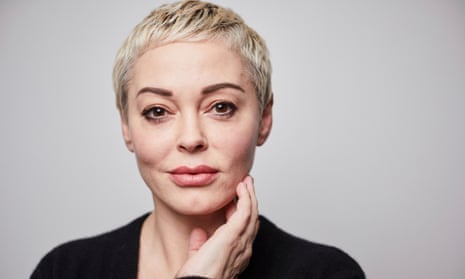Rose McGowan was born into a cult – the Children of God – and has spent most of her working life in what she considers another secretive, manipulative sect: Hollywood. As an actor, she appeared in Scream, Grindhouse and the supernatural TV drama Charmed. In 2017, McGowan accused Harvey Weinstein of raping her in 1997, and her revelations set off the chain of the events that led to the producer being sentenced to 23 years in prison in 2020. McGowan is 47 and lives in Mexico City; she has a forthcoming 10-part podcast, The Brave Truth, which combines tales from her extraordinary life with idiosyncratic riffs on subjects from politics to Britney Spears.
In your podcast, you describe your life as being “stranger than fiction”. Is that a blessing or a curse?
I think it’s both. At times, I wonder why I can’t be whatever normal is, and why I have this strange drive to tell the truth. And sometimes I just wish I could live a regular life, but I don’t really know what that looks like. I think that’s unattainable for me, and so I try to surround myself with beauty, with plants or flowers, to ameliorate a lot of the ugliness I’ve experienced.
In the episode about Britney, you make the point that when someone becomes famous, there’s a public perception that they deserve whatever they get, basically. Have we become crueller as a society?
Well, if you go back to Roman times and gladiators, I don’t know if it’s become crueller. But it’s a different method of cruelty delivery, if you will. People used to come up to me on the streets and poke my breasts and say, “Oh, I always wondered if those are real.” Like they own your body. It’s just this idea that anybody, either in person or online, can say and do anything they want, with impunity, and without any thought of what you’re maybe doing to someone’s mental health whose only crime is trying to entertain these people.
Did you move from the US to Mexico to put some physical distance between you and that world?
I just needed distance from stupid people, at the end of the day. It’s very toxic there: the climate, the mental health. It is so sad. And I didn’t want to live so close to the enemy, if you will.
How are you enjoying it there?
Everyone always says Mexico is so corrupt. But it’s corruption for people that is affordable, in a way: like, you can pay off a cop to get out of a ticket. But in America, you can buy off entire police departments against people and you can do a lot of evil things – you just have to be a multimillionaire or a billionaire with power. So, in a weird way, Mexico with its corruption is certainly a lot more egalitarian.
What are you doing creatively now?
I’m looking at the NFT [non-fungible tokens] space, I find that fascinating. In the past six years, I’ve amassed quite a body of short-form visuals, and the NFT world is perfect for it. I don’t believe in gallery walls and museums, where the public only gets what’s left over after the rich people buy it up.

You’ve described acting as “very easy”. Is it true that you only did one acting class?
Yeah, I did one acting class after I started my first movie, after they discovered me. And I hated it. For me it was always fiscal; it was a matter of survival. I just happen to be naturally good at it. Had I not been blacklisted by Weinstein I might have gone on to have a better career and probably spread my wings more in the acting department. But I had to take the crumbs that I could get. So I did as well as I could, despite the Hollywood blacklisting, which they’ve only doubled down on since the exposing and taking down of their cult leader.
Did you follow the allegations of harassment and bullying that were made by more than 20 women against the director and actor Noel Clarke in the UK?
I did, yes. And they were a bit shocking. The thing is, for every one of those women, how many didn’t come forward? And did people know, and just were like, “This is how it is”?
When I was acting there were male actors I worked with who, when they had to do a sex scene, they would wear this… they called it a “cock sock”. I don’t know how to say that nicely. And they would literally have the young costume design assistant come in and put that on for them. Because they couldn’t do that themselves. And that’s acceptable… what job on the planet would that be OK in, other than this weird world? And if you object, you have to be willing to kill your own career for somebody else’s misdeeds. It’s really not OK.
Is that how it feels?
Yes, absolutely. I did an interview in Germany and the man holding the microphone put it down when I was done, and he said a German phrase. I asked him what it was and he said: “You’re the one who lays on barbed wire so others can walk on your back. And you feel every step.” It was a huge gamble, a huge gamble. I just knew if I could hang on, I could do it.
Before speaking out against Weinstein, you shaved your head. What impact did that have?
The side effect immediately was that people could hear the words coming out of my mouth, because I didn’t look like a traditional woman any more. All of a sudden, people were paying attention. But it was also like, “I’m serious. And I’m going to war. And I need to scare people. So let’s go.”
